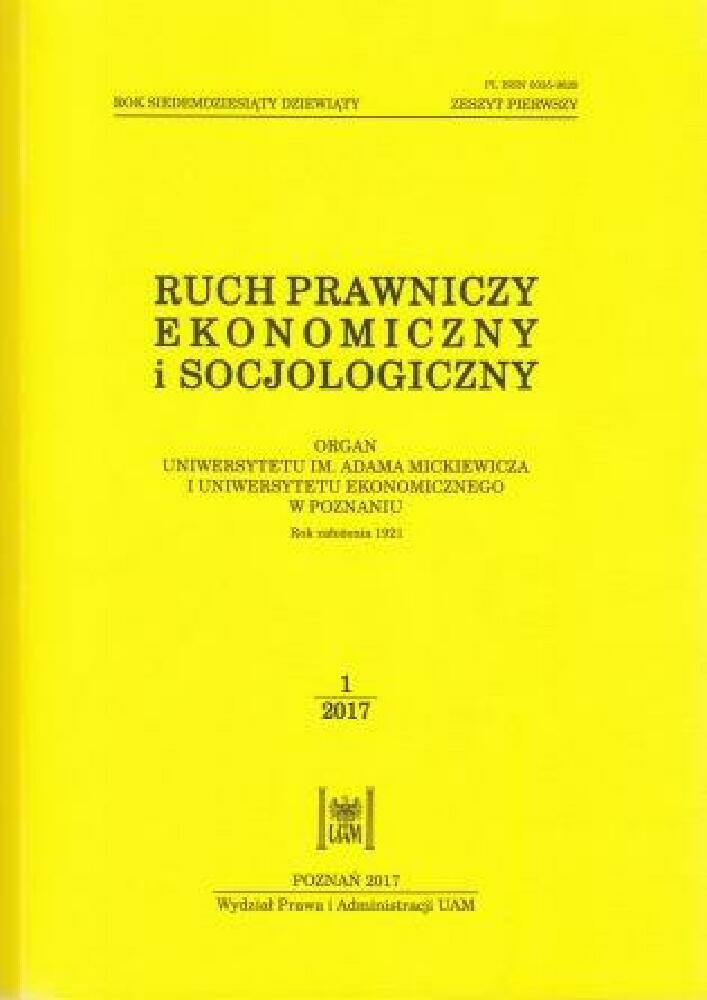Abstract
By virtue of the Anti-Terrorist Act of 10 June 2016, the provisions of the Additional Protocol to the Council of Europe Convention on the Prevention of terrorism have been incorporated into to the Polish legal system. As the result, a new Article 259a has been added to the Polish Penal Code. A short analysis of this new regulation conducted within this paper has revealed a number of profound doubts about its wording and its possible interpretations. The legislator appears to be clearly violating the basic principles of good criminal law by valuing twice the same the intent of a perpetrator: primarily as the very ratio legis of criminalization and secondly as the basis for theobligatorily increased severity of punishment. Consequently, the perpetrator is being punished for a normally legal act yet committed with a special intent and because of this special intent is being punished more severely (sic!). Those doubts constitute the starting point for more general considerations about the choice of a proper method of criminal reaction to prohibited acts committed by the perpetrators, whose the motifs are considered to have been especially noxious, like in the case of the terrorists. The analysis has led to a conclusion that the current shape of the regulations in Poland aimed at combating the growing phenomena of terrorism gives rise to serious
doubts about their inner coherence and congruence with the constitutional norms. It is to be hoped that as soon as the full democratic procedures in Poland are restored they will be verified by a competent and independent constitutional court.
References
Aleksandrowicz, T.R. (1988), Pojęcie czynu o charakterze terrorystycznym de lege lata i delege ferenda (wybrane zagadnienia), Problemy Prawoznawstwa 10.
Donini, M. (2007), Das Strafrecht und der "Feind", Lit Verlag, Berlin.
Fernández, E. A., Vallejo, M.J., Perrino-Pérez, Á.L., (2016), Viajes al extranjero con fines terroristas: el debate sobre la cuestión y la necesidad político criminal de su tipificación penal, [w:] Terrorismo en el siglo XXI, red. E.A. Fernández, Dykinson.
Günter, J. (2004), Bürgerstrafrecht und Feindstrafrecht, Höchstrichterliche Rechtsprechung im Strafrecht.
Heinz, B.W. (2007), Mehr und härtere Strafen – mehr Innere Sicherheit! Stimmt diese Gleichung? Strafrechtspolitik und Sanktionierungspraxis in Deutschland im Lichte kriminologischer Forschung, 31.03.2007, Kansai Universität, Osaka, http://www.uni-konstanz.de/rtf/kis/Heinz_Mehr_und_haertere_Strafen_he306.pdf.
Hoffman, B. (2001), Oblicza terroryzmu, Bertelsmann Media, Warszawa.
Hołyst, B. (2009), Kryminologia, Wydawnictwa Prawnicze PWN, Warszawa.
Huk, T. (1986), Glosa do wyroku SN z 22.1.1985, IV KR 336/84, Palestra 12.
Indecki, K. (2009), Stosowanie praw człowieka wobec sprawców aktów terrorystycznych, [w:] Indecki, K., Potejko, P. (red.), Terroryzm. Materia ustawowa?, ABW, Warszawa.
Kolasiński, B. (2002), Dyrektywy wymiaru kary wobec sprawców, Prokuratura i Prawo 5.
Kunze, E. (1991), Przygotowanie przestępstwa w ujęciu polskiego prawa karnego, WN UAM, Poznań.
Lewis, B. (2002), The Assassins, Basic, New York.
Liedel, K. (2006) Terroryzm. Anatomia zjawiska, WN Scholar, Warszawa.
Majewski, J. (2016), Komentarz do art. 115 § 20, teza 13, [w:] Wróbel, W., Zoll, A. (red.), Kodeks karny. Część ogólna, t. 2, cz. 2: Komentarz do art. 53–116, wyd. 5, Wolters Kluwer, Warszawa.
Maogoto, J.N. (2016), Battling Terrorism: Legal Perspectives on the Use of Force and the War on Terror, Routledge, New York.
Marzahn, T. (2010), Das Feindstrafrecht als Komponente des Präventionsstaats?, Lit Verlag, Augsburg.
Miraglia, M. (2005), Una nuova normalità: metamorfosi della giustizia penale statunitense dopo l'11 settembre, Cassazione Penale 1224.
Mullikin, A., Rahman, S.M. (2010), The ethical dilemma of the USA government wiretapping, International Journal of Managing Information Technology 2(4).
Wilkinson, P. (1979), Terrorism and the Liberal State, John Wiley and Sons, Halsted Press, New York.
Pawłowski, A. (1980), Terroryzm w Europie w XIX i XX wieku, Zielona Góra.
Pohl, Ł. (2007), Struktura normy sankcjonowanej. Zagadnienia ogólne, WN UAM, Poznań.
Radoniewicz, F. (2015), Techniki implementacji do polskiego porządku postanowień decyzji ramowych Rady Unii Europejskiej dotyczących prawa karnego materialnego, Przegląd Prawa Konstytucyjnego 3.
Sinn, A. (2006), Moderne Verbrechensverfolgung – auf dem Weg zu einem Feindstrafrecht?, Zeitschrift für Internationale Strafrechtsdogmatik 3.
Sońta, C. (2005), Przestępstwo o charakterze terrorystycznym w prawie polskim, Wojskowy Przegląd Prawniczy 4.
Sroka, T. (2015), [w:] Zawłocki, R., Królikowski, M. (red.), Kodeks karny. Komentarz, t. 1, C.H. Beck, Warszawa.
Wojciechowski, S. (2013), Terroryzm na początku XXI wieku, WN Contact, Poznań.
Zagorzały, R. (2007), Przestępstwo o charakterze terrorystycznym w polskim prawie karnym, Prokuratura i Prawo 7–8.
Zawłocki, R. (2011), [w:] Zawłocki, R., Królikowski, M. (red.), Kodeks karny. Komentarz, t. 1, C.H. Beck, Warszawa.
Zöller, M.A. (2009), Terrorismusstrafrecht, Ein Handbuch, C.F. Müller, Hamburg.
Zöller, M.A. (2010), Willkommen in Absurdistan – Neue Straftatbestände zur Bekämpfung des Terrorismus, Goltdammer's Archiv für Strafrecht.
Zöller, M.A. (2014), Strafrechtliche Verfolgung von Terrorismus und politischem Extremismus Zeitschrift für Internationale Strafrechtsdogmatik 9.
License
Copyright (c) 2017 WPiA UAM

This work is licensed under a Creative Commons Attribution-NonCommercial-NoDerivatives 4.0 International License.




